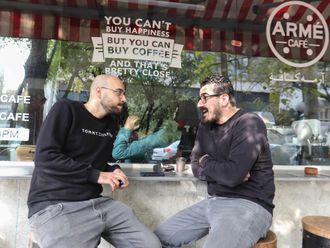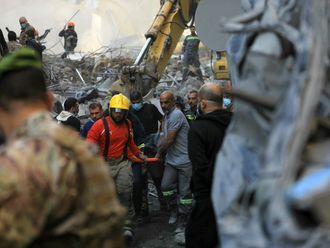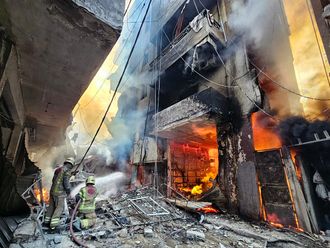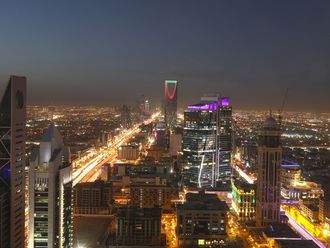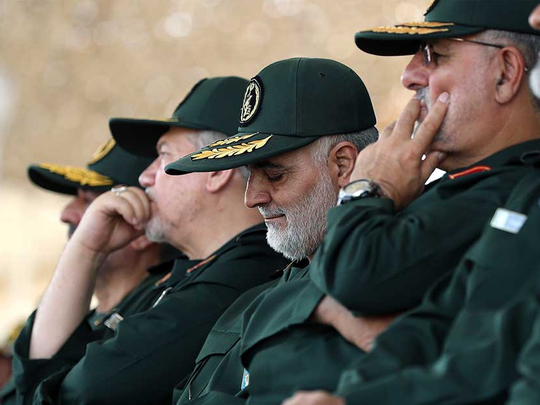
US president Donald Trump ordered the killing of the powerful commander of Iran's Revolutionary Guards Corps, Maj. Gen. Qasem Soleimani, in a drone strike on the Baghdad International Airport early Friday, American officials said.
Soleimani's death was confirmed by official Iranian media.
"General Soleimani was actively developing plans to attack American diplomats and service members in Iraq and throughout the region," the Pentagon said in a statement. "General Soleimani and his Quds Force were responsible for the deaths of hundreds of American and coalition service members and the wounding of thousands more."
"This strike was aimed at deterring future Iranian attack plans," the statement added. "The United States will continue to take all necessary action to protect our people and our interests wherever they are around the world."
The killing of Soleimani was a major blow for Iran and a major escalation of Trump's "maximum pressure" campaign against Iran, which began with economic sanctions but has steadily moved into the military arena.
The strikes followed a warning on Thursday afternoon from Defense Secretary Mark Esper, who said the U.S. military would preemptively strike Iranian-backed forces in Iraq and Syria if there were signs the paramilitary groups were planning more attacks against American bases and personnel in the region.
"If we get word of attacks, we will take preemptive action as well to protect American forces, protect American lives," Esper said. "The game has changed."
In Iran, state television interrupted its programing to announce Soleimani's death.
The American drone strike hit two cars carrying Soleimani and several officials with Iranian-backed militias as they were leaving the airport.
U.S. officials said that multiple missiles hit the convoy in a strike carried out by the Joint Special Operations Command.
The strike killed five people, including the pro-Iranian chief of an umbrella group for Iraqi militias, Iraqi television reported and militia officials confirmed. The militia chief, Abu Mahdi al-Muhandis, was a strongly pro-Iranian figure.
The public relations chief for the umbrella group, the Popular Mobilization Forces in Iraq, Mohammed Ridha Jabri, was killed as well.
Two other people were killed in the strike, according to a general at the Baghdad joint command, who spoke on condition of anonymity because he was not authorized to speak to the news media.
According to the Iraqi general, Soleimani and Ridha, the militia public relations official, arrived by plane at Baghdad International Airport from Syria.
Two cars stopped at the bottom of the airplane steps and picked them up. Al-Muhandis was in one of the cars.
As the two cars left the airport, they were bombed, the general said.
The strike was the second attack at the airport within hours.
An earlier attack, late Thursday, involved three rockets that did not appear to have caused any injuries.
The strikes come days after U.S. forces bombed three outposts of Kataib Hezbollah, an Iranian-supported militia in Iraq and Syria, in retaliation for the death of an American contractor in a rocket attack last week near the Iraqi city of Kirkuk.
The United States said that Kataib Hezbollah fired 31 rockets into a base in Kirkuk province, last week, killing an American contractor and wounding several U.S. and Iraqi servicemen.
The U.S. responded by bombing three sites of the Khataib Hezbollah militia near Qaim in western Iraq and two sites in Syria. Khataib Hezbollah denied involvement in the attack in Kirkuk.
Pro-Iranian militia members then marched on the American Embassy on Tuesday, effectively imprisoning its diplomats inside for more than 24 hours while thousands of militia members thronged outside. They burned the embassy's reception area, planted militia flags on its roof and scrawled graffiti on its walls.
No injuries or deaths were reported, and the militia members did not enter the embassy building.
They withdrew late Wednesday afternoon.
The Pentagon statement Thursday night said that Soleimani "had orchestrated attacks on coalition bases in Iraq over the last several months," including the one that killed an American contractor last Friday.
Soleimani also "approved the attacks on the U.S. Embassy in Baghdad," the statement said.
Trump said Tuesday that Iran would "be held fully responsible" for the attack on the embassy, in which protesters set fire to a reception building on the embassy compound, which covers more than 100 acres. He also blamed Tehran for directing the unrest.
Washington and Tehran appear intent on ratcheting up both their messaging and their forces, raising concerns of a larger conflict.


